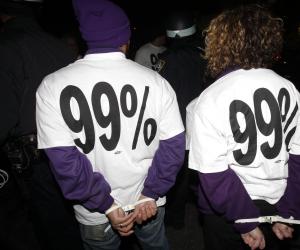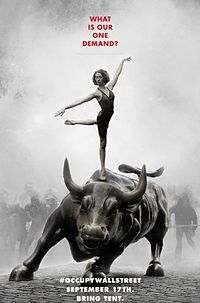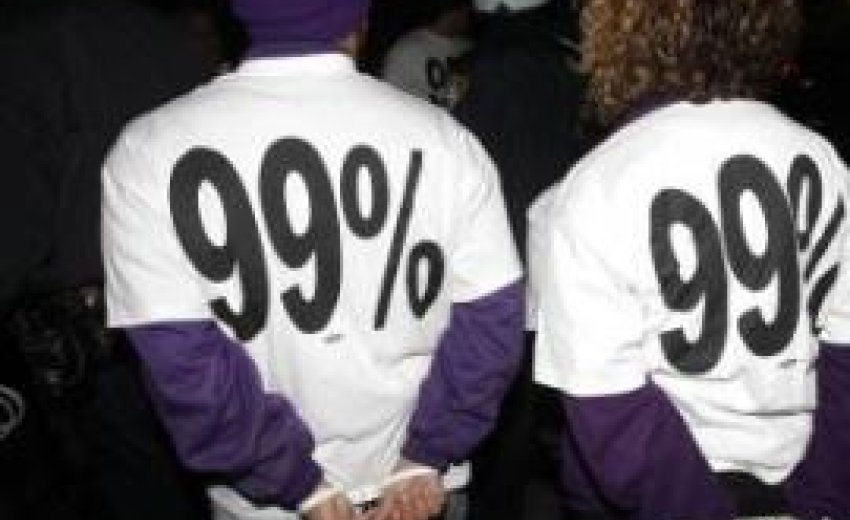|
 It's a heady mix, often explosive - and for me absolutely uncharted territory It's a heady mix, often explosive - and for me absolutely uncharted territory
But these matters - Faith, economy & politics inform us all. They won't leave us alone, nor should we leave them alone. They impact us every day - throughout history and today as well.
Of the various permutations of these three, Political Economy and Political Geography exist as academic disciplines. Politics and Religions have shared common ground from their earliest beginnings since no human activity is free of politics. Their intimate connections have been extensively parsed in academia.
I do not know if there is an existing discipline that explores the nexus between religion and economics very much; analyses of such links are relatively new and sporadic. Surely, there would or should soon be burgeoning programs in this matter. Stranger marriages exist as academic disciplines. In spite of the ongoing debate on the wisdom of market regulations even the most lax MBA courses today recognize the necessity of ethical imperatives, particularly in these post Bernie Madoff days.
In an astoundingly progressive initiative, Yale University, perhaps others as well, now offers an imaginative undergraduate specialty program in Ethics, Politics and Economics. It draws on faculty from each of the three specialized academic disciplines to explore their global interdependence, along with the technological complexity that increasingly defines and impacts our modern society.
It is only by understanding such interrelationships that we can hope to comprehend the intertwined institutional dynamics of power and governance in society. The technical intricacies of economic and statistical analysis, for instance, cannot be studied in isolation - disconnected from the basic moral and political framework that form the foundations of a community and society.
Such matters define and govern our responses whether in coping with natural and social hazards, allocation of limited social resources (e.g., medical care and critical social services or societal safety nets), or morally sensitive political issues (e.g., affirmative action, war crimes, or bioethical issues). Such matters require sensitivity to political, economic, and social dimensions of a society, along with the willingness and capacity to think analytically through the associated questions.
A society needs to educate its citizenry in the implications of such matters.
I also recognize that even though much, though not all, of what is seen as ethics emerges from religion and faith, the two - ethics and faith - remain interconnected and clearly mutually dependant.
This triad of Politics, Economy & Faith create a three legged stool as the defining structure of a progressive society.
A three-legged structure provides optimal stability.
And then I look at the three-legged base of Sikhism that defines a life rooted in honest earning, sharing of life's rewards with others who are needier, and the pursuit of both of these in a life of awareness of the Ultimate Reality that pervades us all and provides a universal connectivity to the creation.
To me, the first leg of the Sikh societal structure, honest earnings, speaks of societal economy. The second leg of the stool addresses who will partake of a society's material bounty and how is to be fairly doled out and shared in accordance with need and that is matter to be debated and determined by political processes and necessities. The third critical leg of the stool provides the ethical and moral imperatives of a progressive and egalitarian society - and that would be faith.
Economy and opportunity for success, however, are inseparably interdependent, and that cannot be ignored.
It is not surprising, therefore, that during the present election cycle in the United States the debate has been defined and fueled by the Tea Party on the Right and the Occupy Movement on the Left.
In a one sentence summary, like the Cliff Notes in college, I would say that The Tea Party is driven by its suspicion of big government, while the Occupy Movement owes its raison d'être to its suspicions of big corporations unfettered by oversight or regulations.
History records a world of occupations - of people, land, treasures, sea lanes, even space. Keep in mind the timeless struggles to capture and occupy the hearts and minds of people.
Now it is to occupy Wall Street, Churches, Schools, government buildings, and Public Parks I remember another phase of such history - the days of Vietnam - when it was to occupy university administrative buildings and shut down the system. Then there was Gandhi in India who led millions armed with the weapon of non-cooperation - The goal was occupying for political change.
What is this Occupy movement really about? A reaction to what is it?
The "occupy" paradigm emerges from a failure at the core of a society's fundamental duty to its citizens?
What lies at the heart of the Social Compact that exists between a society and its people?
An egalitarian, just and progressive society works to provide equality of opportunity for success -- not of attainment. This is what we mean by the expression "life, liberty and the pursuit of happiness." The key word here is "pursuit."
In the final analysis the Occupy movements reflect inequality in resources and opportunities - ultimately of power over our own lives.
When politics is driven by economy inequalities are inevitable. How about when politics is driven by faith? How just or inclusive is it then. When politics and religions become inseparable then religion-based states emerge that may be neither just nor inclusive..
The Occupy movement is now international - from Wall Street in New York to the streets of Cairo. It seems unfocused but it is clearly aimed at the growing social and economic inequalities that exist. People may differ on the extent of the disparities; but they see the large corporations and global financial systems operating to disproportionately benefit a minority, thus undermining the social order.
Hence the genesis of the defining slogan of the Occupy Movement "We are the 99%."
It refers to the concentration of wealth among the top one percent of income earners compared to the other 99 percent - that's you and me.
But in a society where the economy is the driving engine for our lives results would vary and inequality would be inevitable. Why should one react so angrily at the success of others -- as Mitt Romney might ask -- particularly when they are only one percent? Where is the problem?
Note that the richest 1 percent of Americans nearly tripled their after-tax income in the last decade according to the Congressional Budget Office. I needn't tell you how we, the 99 percent, fared in that time.The degree and extent of inequality are the core of the problem. Severe inequality robs us of opportunities and makes us unequal in the pursuit of life liberty, and happiness. When 99% suffer, society as a whole is degraded.
 We have to face two issues: 1. Religions speak to a sense of ethics as the foundational principles of society. Religions need to work for social justice. 2. Beware of the ties between religion and political power in history. We have to face two issues: 1. Religions speak to a sense of ethics as the foundational principles of society. Religions need to work for social justice. 2. Beware of the ties between religion and political power in history.
Just look at the long colorful and bloody politico-religious history of mankind, particularly of Jihads and Crusades. Emerging from this is the formation of religious states defined by religious law. In that my thoughts go to Israel and Pakistan, though history has known many more. This is an issue that historically cannot be so casually dismissed and deserves a fuller treatment, perhaps another time. There is also another side to the coin: I want to point out that religious practices and worldview have also given to the world liberal and tolerant values that are good forever.
Sikhi or Sikhism occupies a singular and defining place in the history of these matters. From its very beginning Sikhism recognized that the spiritual bases of a life must not be sundered from the temporal life lived here on Earth. This is what we term the Meeri-Peeri doctrine.
Guru Gobind Singh, the last of the Sikh Founder-Gurus is reputed to have observed that religions do not thrive without political might (Raaj binaa nahi dharam chaaly hae.) Yet the founder-Gurus never looked to occupy political space. They did not ever wage war to conquer territory, people or property; even though there were opportunities aplenty when they could have carved out such space by arms or by diplomacy.
Many a time the Gurus identified themselves with the poor, dispossessed and the down trodden; the low caste people who had no place in the traditional Indian society, and also women, who lived a precarious existence; they depended on their father before marriage and their husband afterwards; a widow's choice was self-immolation or a life of denial.
Sikhs arose from the fringes of society in northwest India - today the Occupy movement would lump them as the rock-bottom of the 99 percent. Sikh teachings transformed them so that they became masters of Punjab and makers of their own destiny - almost like the one percent.
Guru Nanak, the founder of Sikhism, celebrated and exalted this so called 99 percent. Said he that none is high or low (Nanak uttam neach na koye, Guru Granth, p. 7). Also Guru Nanak said that grace pervades where the poor are cared for (Neecha under neech jaat, neechee hoo et neech; jithay neech samalian, tithay nadar teri bakhsees, Guru Granth, p. 15). Guru Gobind Singh the Tenth Sikh Master credited these 99 percent for all of his own successes (Inhi hee ki kirpa te sajay hum hae(n)).
All the battles that the Gurus fought were for the right to be -- and absolutely not to accept conversions under any blandishments or duress. Thus to be able to live with dignity and follow the different beat of the distant drummer, as they heard it.
When for about half a century, a Sikh, Ranjit Singh, ruled the vast territories of northwest India, his energies went to developing a secular state and the rule of law where Hindus, Muslims and Sikhs were equal partners.
Almost a century before him, Banda Singh Bahadur, the intrepid Sikh general instituted the first land reforms ever seen in that part of world.
Now how could I, a Sikh, NOT identify with or celebrate the "Occupy movements" that promise to play havoc with class distinctions? Even if it's in Texas and over a cup of tea from a Tea Party enthusiast.
(Based on a speech by the author at "Infinite Wisdom" an annual interfaith event hosted by the Sikh Research Institute on August 15, 2012, in San Antonio, Texas.) - August 31, 2012 |

